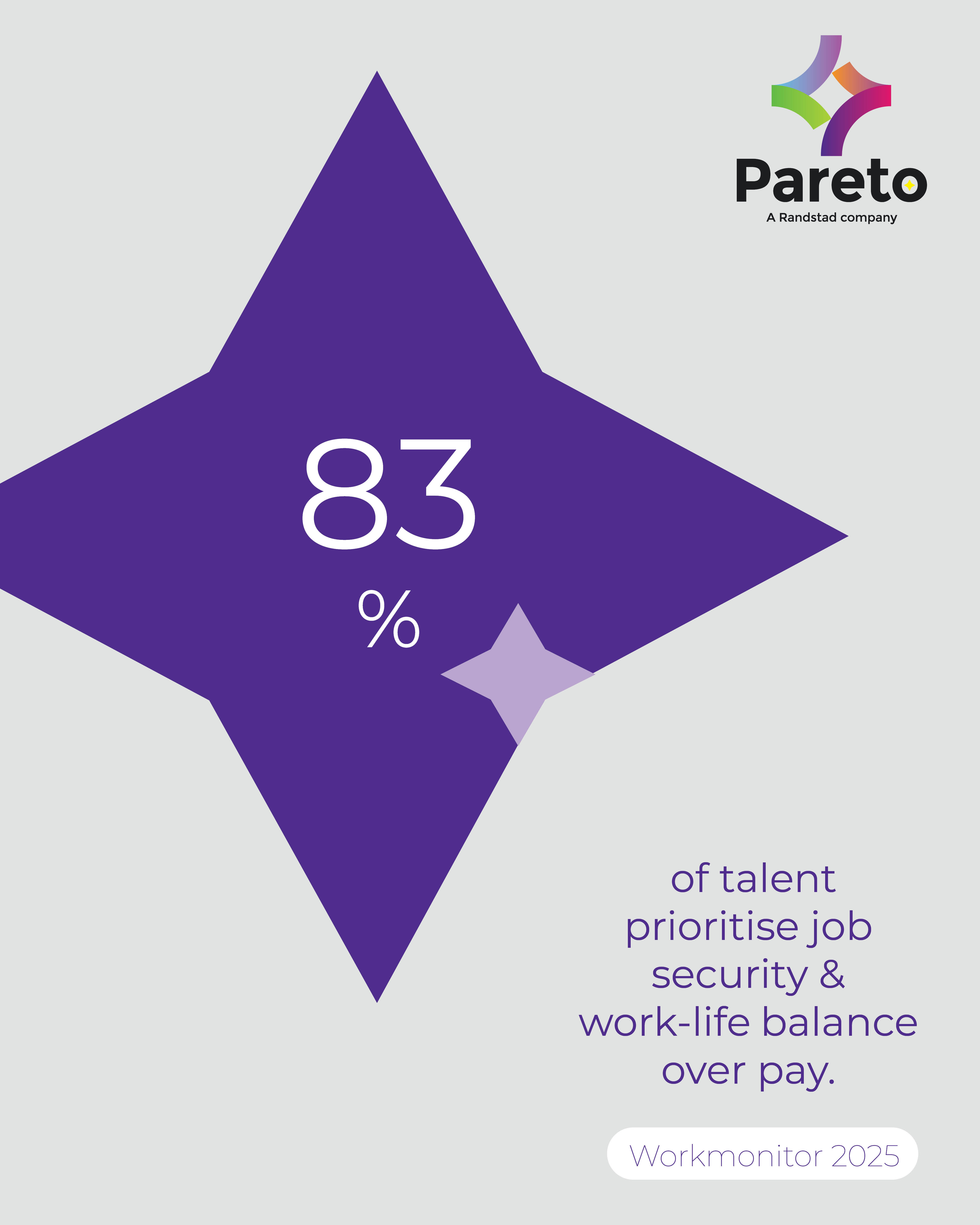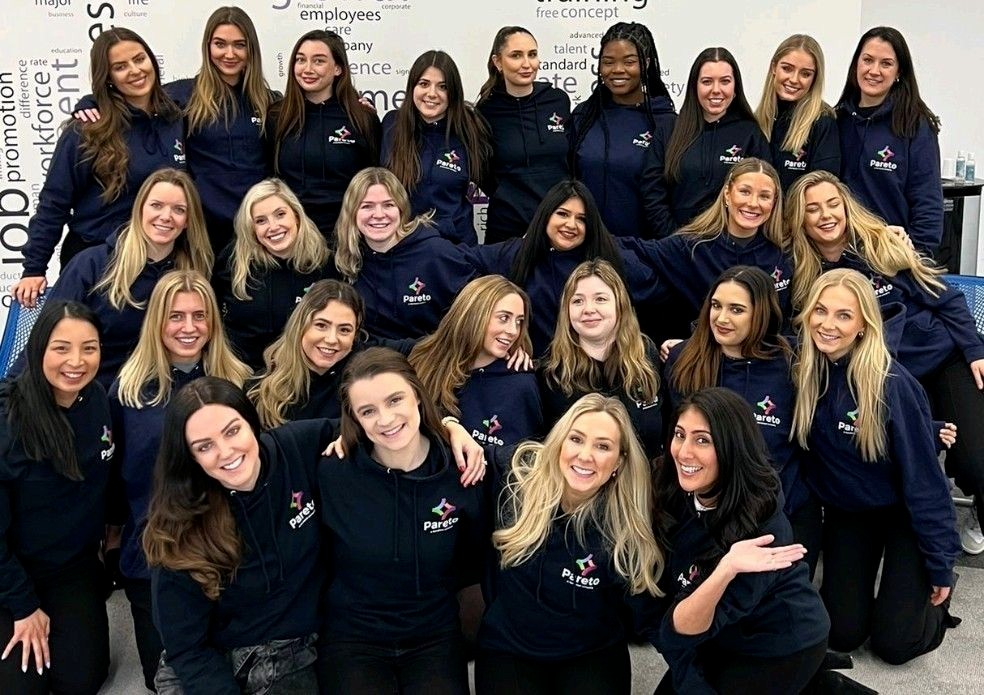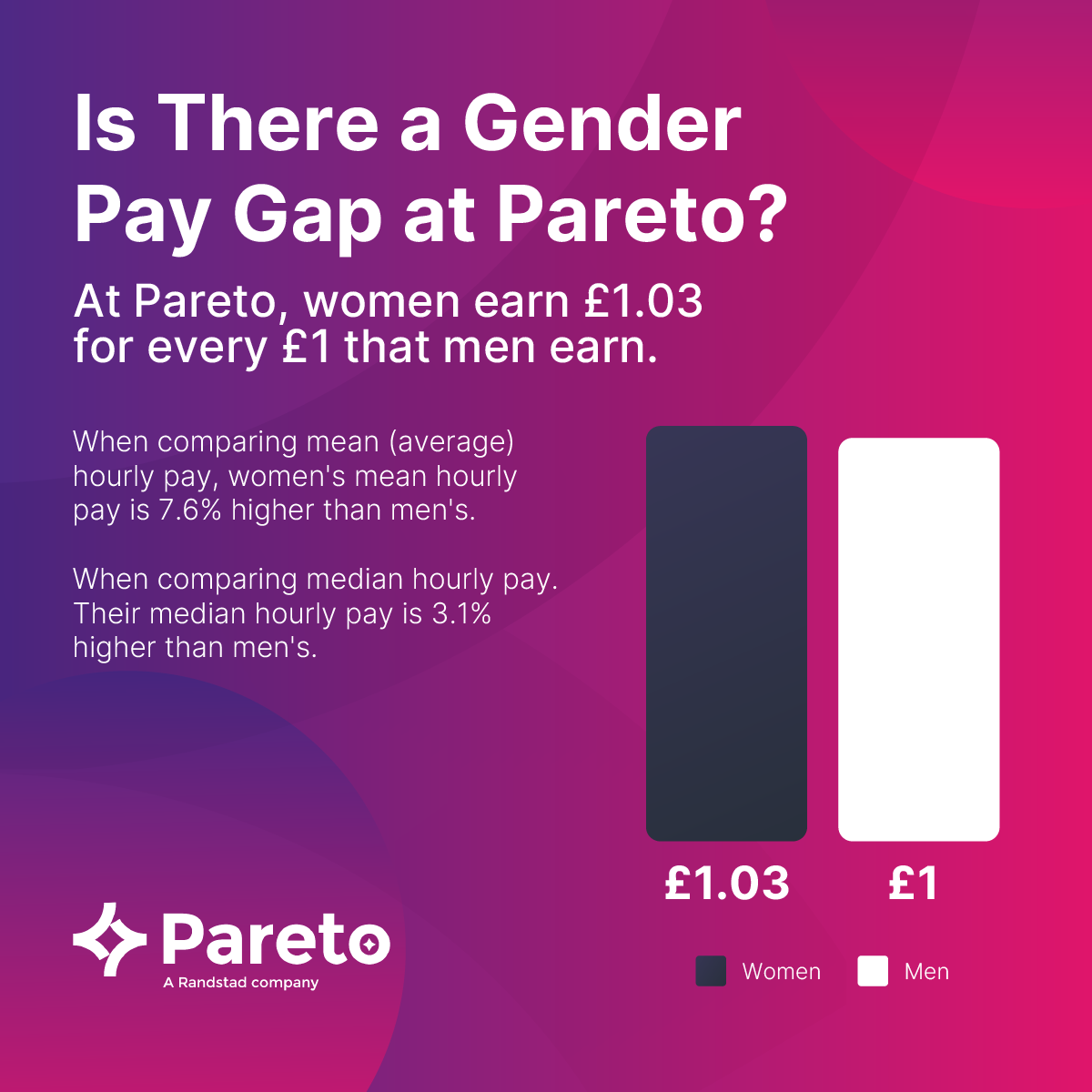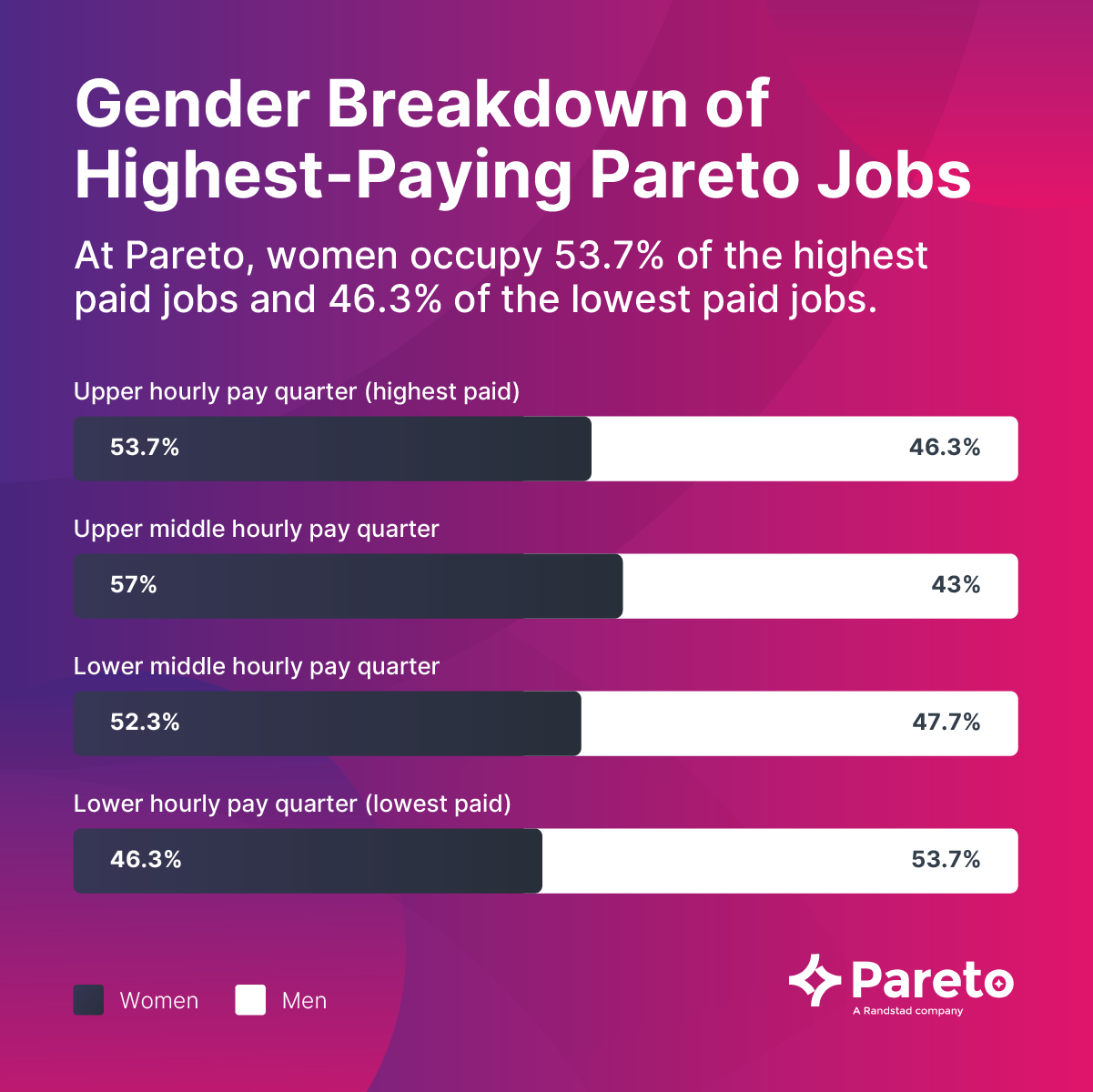
Drop off your CV
At Pareto, we go above and beyond to find the right fit for both you and a prospective employer. Taking people of high potential and placing them in positions where they can excel.
At Pareto, we go above and beyond to find the right fit for both you and a prospective employer. Taking people of high potential and placing them in positions where they can excel.
Learn from Pareto's success in promoting female leaders: remove barriers, provide equal opportunities, embrace diversity, pay for performance.

By Pareto Team

In today’s climate, the representation of female leaders is low. For example, the representation of women in leadership stands at only 30% in the UK, according to LinkedIn data. More specifically, regarding sales leadership roles in the UK, only 19% are held by women.
Despite these low figures, a study by Xactly Corporation revealed that female sales leaders are more effective than men. Their findings showed that women-led teams achieved a higher win and attainment rate than those headed by men, as shown below.
Unfortunately, the lack of representations of female business leaders results from a lack of diverse recruitment strategies, archaic stereotypes, sexism, and the gender pay gap, amongst other factors. In this blog, we will delve into How we promote female leaders in the workplace. But before then, watch the video below and hear from two inspirational female leaders who have risen to the top at Pareto.
At Pareto, since we began our journey over two decades ago, we have always advocated for promoting female leaders in the workplace. Our approach to diversity and inclusion has helped empower people to realise their potential and has been a significant factor in our success. When it comes to female business leaders and the representation of women in the workplace, we have strived to remove all the barriers and provide equal opportunities to help drive female leaders to the top.
But how do we promote female leaders in the workplace? In this section, we will answer this question with first-hand accounts from our inspirational female leaders. At Pareto, we practice what we preach, and our approach to promoting female leaders has been a success for us, and it can be a success for you too. From helping you become part of The Great Retention and enhancing your team's performance to attracting new hires, our approach can help drive change and progression for your business.
So, if your business is looking to support female leaders in the workplace, take inspiration from our approach below.
Arguably, when it comes to gender equality in the workplace, the most significant factor often discussed is the gender pay gap. As reported in an insight by Great Place to Work, women in the UK were paid 90p for every £1 earned by men. Additionally, female sales leaders are reported to earn 25% less than males in the same role, despite often outperforming men, as we mentioned earlier. Further, in 2021, a report from Pwc revealed how two in five companies reported a wider gender pay gap.
Of course, more must be done across the board to make annual pay, salaries and commission rates for the same roles equal for both men and women. However, when we get asked, is there a gender pay gap? We reply with, what gender pay gap?
Why do we say this? Well, because our latest gender pay gap report revealed the following.


The fact our women earn more on average than men is inspiring for women in the workplace and is one way we promote female leaders at Pareto. However, how we pay and reward our people is not based on gender alone. It comes down to performance and the results our salespeople achieve for our brand, and we give our people an equal opportunity to succeed. Ultimately, our women and female leaders edge the men within our business from a monetary perspective because they outperform them and deliver higher results.
When we hire internally or support clients with their recruitment challenges, we go beyond the CV of the individual and look for the core competencies within a person. Having an innate desire and ambition to succeed while being an individual with a hard-working mindset and a passion for progressing within a role are just some of the key competencies we look for in talent.
For example, our Regional Director, Sarah Skelton, came to us with a work ethic instilled within her by her upbringing, something she has carried with her throughout her career and a competency that has seen her rise to the top.
“My mum was 100% my biggest role model and my biggest supporter. (...)I’ve always grown up with that work ethic, and the more you put in, the more you get out. I think on top of that, she’s taught me that you can go for whatever you want. There is no limit.”
Sarah Skelton, Regional Director, Pareto
Of course, specific competencies and technical skills can be taught and nurtured. However, we focus on finding the people whose competencies fall under the characteristics surrounding their attitude and mentality - the more innate competencies. As our SVP of Sales, Gabrielle Crofts, says, there’s no reason a person can’t get to the top if they have the desire, attitude and drive.
“If I was going to give my younger self a message, it would definitely be, don’t think for a second that you can’t have that job, and I would like every young girl to hear that message as well. There is no reason why you can’t have that job, it’s about your desire, your attitude and your drive. I really believe that.”
Gabrielle Crofts, SVP of Sales, Pareto
Onboarding and retaining people with the competencies discussed above is crucial for any business striving to succeed Our female leaders, like Sarah and Gabrielle, are prime examples of possessing the core competencies we look for in our people and help promote our women in the workplace, both current and future female sales leaders.
When recruiting new talent, it's essential to avoid any unconscious bias. Hiring an individual based on a combination of first impressions, their CV, their personality, their skill set and competencies, and if they would be a cultural fit are all valid. However, the people who determine who is best suited to your brand shouldn't be determined by one or the same group of individuals.
To overcome this, ensure your recruitment team and interview panel consists of a range of people from different backgrounds, departments and seniority. Ultimately, in recruitment, having a diverse set of opinions can help you find the best person for your business.
“My advice to any organisation that wants to genuinely cultivate a culture that is equal and diverse is, first of all, to ensure that you have diversity in your interview panel, ensure that you’ve got diversity within your social media on your website and that you’re celebrating women or any form of diversity to ensure that when people are applying, they can see people like them.”
Gabrielle Crofts, SVP of Sales, Pareto
Additionally, something we're always looking to bolster at Pareto, you should consider how your employer brand represents diversity and inclusion online, be it on your website or socials. Ensure people can see how you're embracing D&I across all your channels. This will benefit your business when you recruit new people and widen your talent pool.
“Pareto has been a very inclusive organisation for 27 years and I’m a big believer that our late managing director had a big part to play in that. We’ve always had female sales directors from the start, so there was no reason for women not to believe they could also have the top job.”
Gabrielle Crofts, SVP of Sales, Pareto
Another way we promote female leaders in the workplace is by supporting working parents. We value our female leaders and go above and beyond to help them when they are preparing to go on maternity, when they are away from the company and most importantly when they are looking to return to work.
Sarah was the first female leader at Pareto who went on maternity and returned to a part-time role. Her success in returning and delivering exceptional results in a part-time position pioneered how we support working parents.
“I think as I’ve developed in my career, I was the first female in the sales team to go and have a baby and then returned as not a full-time seller. Pareto was forward-thinking enough then to give me the opportunity to be part-time and continue in a sales role. And many women have followed suit."
Sarah Skelton, Regional Director, Pareto
Your business can follow suit by accommodating the needs of your people who need to balance their occupations with their responsibilities as a parent. From providing flexible working hours, offering part-time work, and communicating with your people to understand and try to cater to their needs, there are many things you can do to support your working parents.
“Pareto is great at helping me balance being a businesswoman and a mum. At no point am I asked to compromise. I’ve got a great boss and great flexibility, and now I'm really proud that I’m able to help shape that for our working mums in our business, of which there are many.”
Gabrielle Crofts, SVP of Sales, Pareto
Additionally, not only will you be supporting your working parents, but you will be increasing the likelihood of your working parents staying loyal to your brand, giving your employee retention rate a boost. Additionally, candidates often look for the benefits provided by an employer. If they see your brand promotes the support of working parents, they will be more inclined to apply to join your team.
When someone sees another person within the business who they admire professionally or can relate to, be it through their gender, ethnicity or background, this can be both inspirational and motivational.
As part of our attraction and retention strategy, we continue to develop role models. We have found that giving our employees a diverse range of senior people to look up to has enhanced the performance of our talent and given people the drive to climb the career ladder within our business.
“I think we’ve always had strong female role models, which are really important because you can talk the talk, but if you can’t see people like you at the top, then you may lack the belief that there’s the opportunity to get there.”
Sarah Skelton, Regional Director, Pareto
Our inspirational female leaders, like Sarah and Gabrielle, are fantastic examples of the current role models we've developed at Pareto. Their transformation into role models for our brand stems from the role models who came before them, and in turn, their influence will inspire the next generation of role models.
“I chose my career in recruitment because I saw so many powerful women leaders in the business, leading from the front, living incredible lives and I wanted to be successful as well.”
Gabrielle Crofts, SVP of Sales, Pareto
So, think about who within your business is a role model for your employees and think about the people who have the potential to become future role models for your brand. Ultimately, your current and future role models can play a significant role in the long-term success of your business.
Get in touch with us to speak to Gabrielle and Sarah about their journey and what you should be implementing in your business to realise your female leaders' potential.
As a market leader in growth and transformation with over 25 years of experience assessing the competencies of the top, diverse sales leaders, placing passionate people and training talent with potential, we know what it takes to promote female business leaders. So, if your business needs support with embracing diversity and inclusion or requires help finding the best female leaders on the global market. talk to the team today.
Discover how you can recognise the potential of the females within your workplace and promote potential from within by downloading our insight on 'How to retain employees in a challenging market.'

